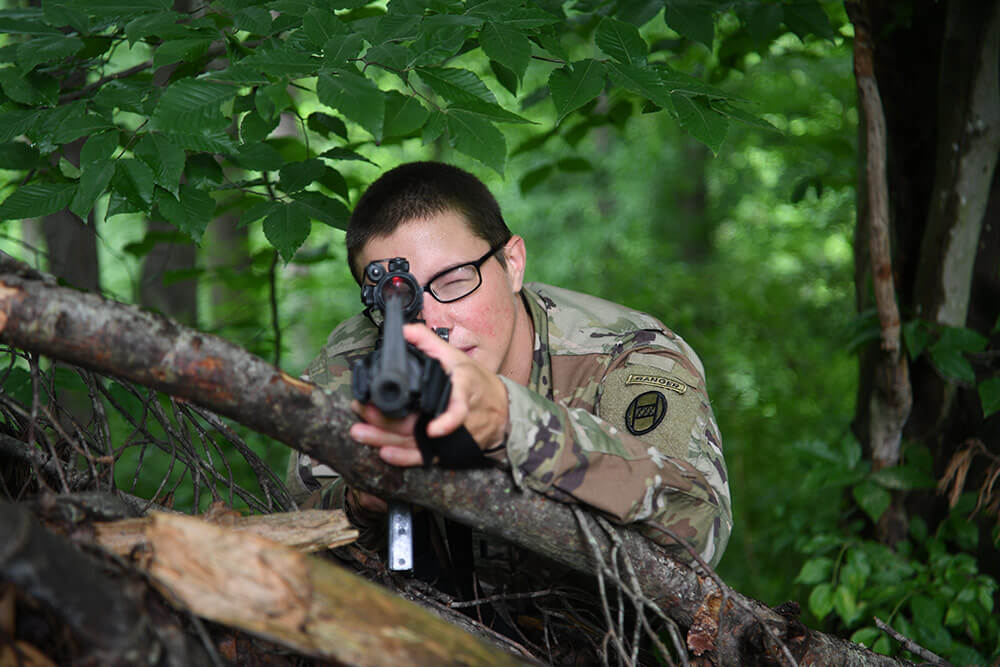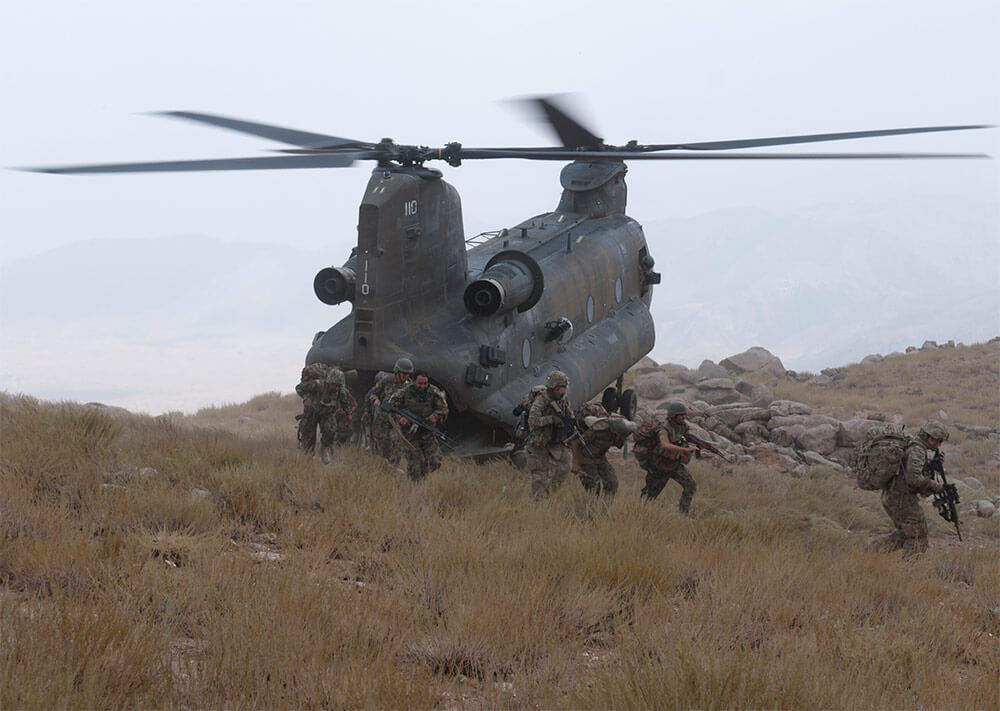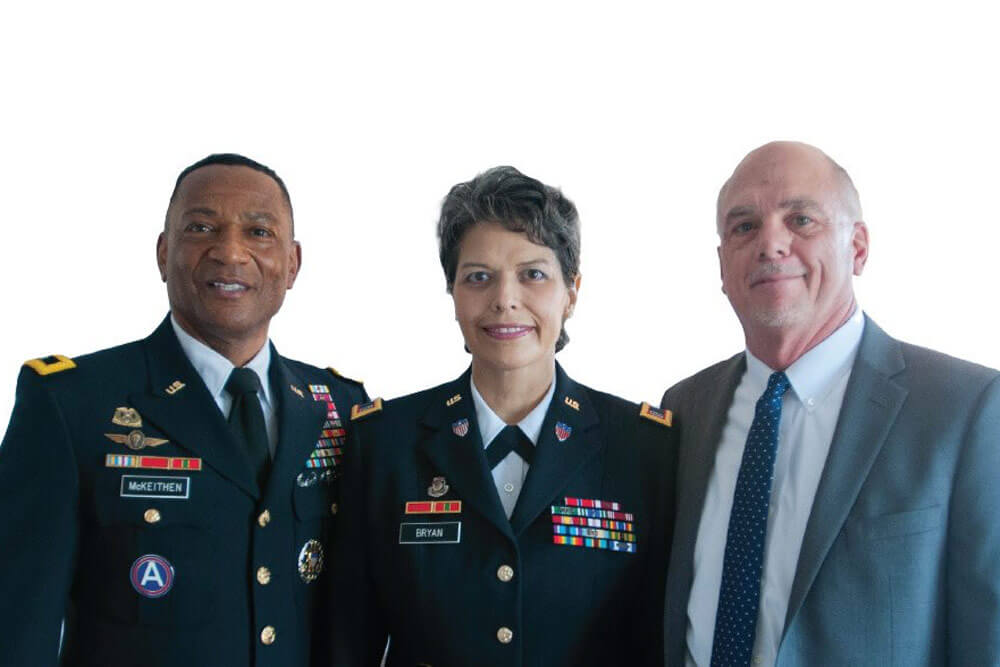Paying Tribute to a Fallen Oklahoma Guard Soldier
After a dedication ceremony in the summer of 2018, a New Kabul Compound (NKC) terminal donned a new name. The Hughie Terminal honors the life of Oklahoma Army National Guard Soldier SGT Buddy James “Doc” Hughie, a member of Charlie Company, 1st Battalion, 180th Infantry Regiment, who was killed in action in 2007.
SGT Hughie’s unit, now reorganized as the 1st Squadron, 180th Cavalry Regiment, deployed to Kabul, Afghanistan, in August 2018 in support of the NATO-led train, advise and assist mission, Operation Resolute Support. The deployment marked the first time in 10 years the 180th had deployed to Afghanistan.
“What better way to really signify our 10-year return than to dedicate this to SGT Hughie,” said LTC Michael Urrutia, commander of 1st Squadron, 180th Cavalry Regiment.
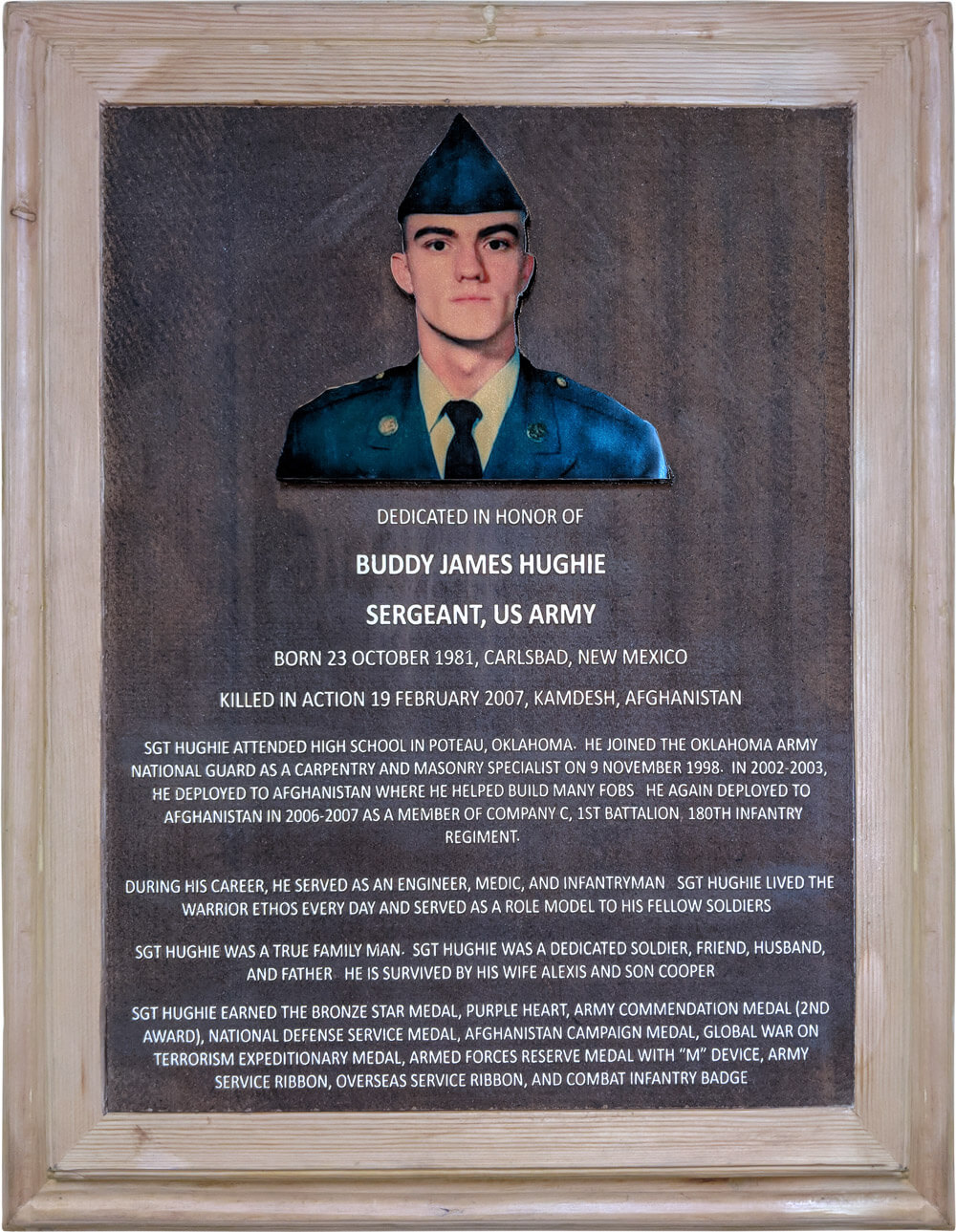
Ten years after making the ultimate sacrifice, SGT Hughie’s service and spirit are still remembered. SGT Hughie was only 25 years old when he was killed in action in Afghanistan. His unit was conducting a joint mission with the Afghan National Army and the U.S. Army’s 10th Mountain Division in Afghanistan’s Nuristan province. On Feb. 19, 2007, the group came under enemy small-arms and rocket-propelled-grenade fire. Though SGT Hughie’s vehicle was secure and out of danger, he left his position to provide medical attention to two Afghan soldiers in the group. On that day, he was shot and killed saving the lives of others.
The moment of heroism that ultimately led to his death was characteristic of SGT Hughie’s selfless heart and dedication to service.
“The whole story of how it all went down tells you what type of Soldier he was,” explained CSM Walter Jolly of the Oklahoma Army National Guard’s 45th Infantry Brigade. “He put his life at risk to save other people’s lives. His not being on the ambush side, but putting himself there on foot and leaving the vehicle to take care of [fellow] soldiers, shows you a lot about him.”
CSM Jolly was also deployed to Operation Resolute Support. Though he was in a different platoon, he had the chance to get to know SGT Hughie.
“He was really mature for his age,” CSM Jolly said. “Everybody liked him. He could get along with anybody.”
The death of SGT Hughie had a lasting impact on the Soldiers of the 180th, leading to the naming of the Hughie Terminal.
“SGT Hughie had a special place in the heart of the 180th because he was the first Soldier to become a casualty for us,” said CSM Robert Apala of the 180th Cavalry Regiment. “To keep his memory alive, we decided to name our flight PAX terminal after him so that no one would forget who he was.”
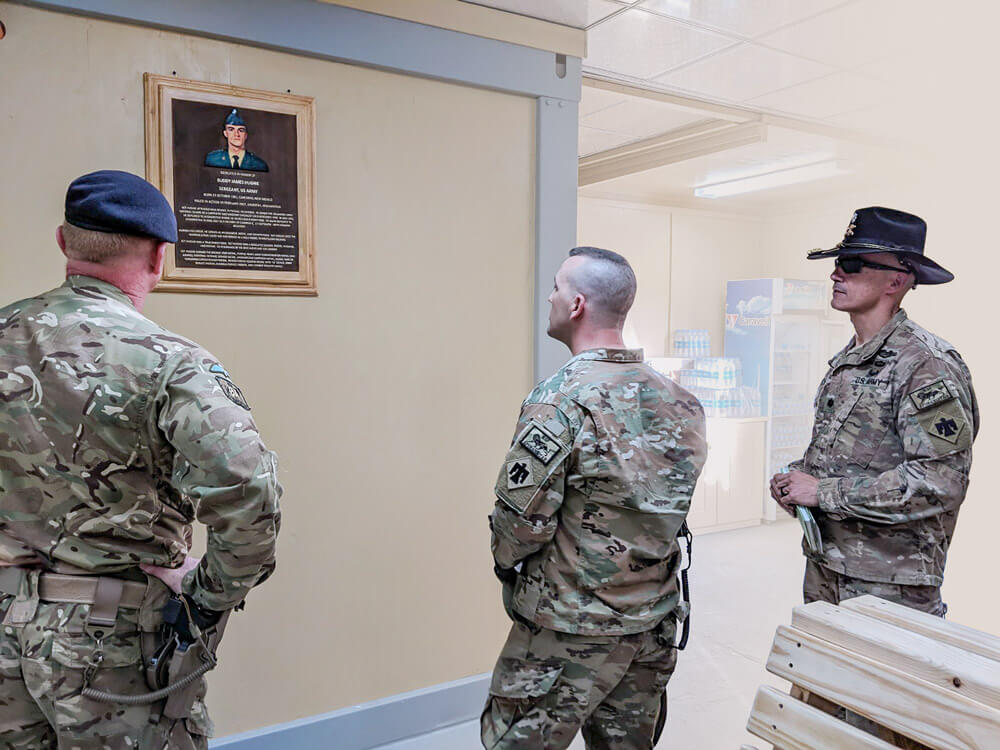
On the wall of the terminal hangs a plaque with a photo of SGT Hughie and a short bio highlighting his contributions to the Army National Guard, the United States and, as allies of the United States, the Afghan nation.
“During his career, he served as an engineer, medic and infantryman,” the plaque reads. “SGT Hughie lived the warrior ethos every day and served as a role model to his fellow Soldiers.”
For his service, SGT Hughie earned the Bronze Star, Purple Heart, Army Commendation Medal (1st Oak Leaf Cluster), National Defense Service Medal, Afghanistan Campaign Medal, Global War on Terrorism Expeditionary Medal, the Armed Forces Reserve Medal with “M” Device, the Army Service Ribbon and the Combat Infantry Badge.
His numerous honors speak to his incredible service and character. Though CSM Apala had limited interactions with SGT Hughie, he said SGT Hughie’s high character was apparent in every meeting.
“As a person, there was none better,” said CSM Apala. “The love for his country and his Family was phenomenal. He was always worried about everybody else. He was the guy who went around the platoon taking care of people. He was a dedicated individual and he was really selfless.”
SGT Hughie’s love for his Family was obvious to many. During his last deployment, he spoke often of his wife, Alexis, and the approaching birth of his son Cooper.
Just two months before his death, SGT Hughie was granted leave to return home to witness the birth of his son. He had expressed his enthusiasm over becoming a father, a sentiment that would leave a lasting memory with the Soldiers who knew him.
“At the time I didn’t have children either, but just to hear him and his excitement that his wife was pregnant and to see his joy and excitement to become a father told you a lot about him,” said CSM Jolly. “He was a good Soldier and a good person. And it was obvious that he was a good father and a good husband. You can’t beat that type.”
Though SGT Hughie saw his son before he passed away, Cooper would have to grow up without the joyous and loving father the members of the 180th knew well.
“For me, February 19th was a very tough day, not only because we lost a fellow Soldier and friend, but like SGT Hughie, I had recently had my firstborn child,” said SFC James Smith, who deployed to Afghanistan with SGT Hughie in 2007 and again in 2018 with the 180th. “February 19th was the day I realized the sacrifice that SGT Hughie and others like him make. It didn’t seem fair that I was going home to my child and Family, but SGT Hughie wasn’t.”
“At least he did get to see Cooper and be there with Alexis when [the birth] took place,” CSM Jolly noted. “But for Cooper to have to grow up and only have stories of his father and not have any remembrance of him is sad.”
CSM Jolly recalled SGT Hughie’s willingness to deploy with the unit during the mission that would ultimately lead to his death. The deployment was SGT Hughie’s second tour in Afghanistan. He had deployed once in 2002, and then again in 2006 when he volunteered to go with the 180th.
“He volunteered for the mission,” CSM Jolly said. “He had already been to Afghanistan on a different deployment and went right back when he joined our unit. He didn’t hesitate on whether he was going or not. He went with us.”
SGT Hughie deployed as an infantry Soldier, but was often called on for another specialty. His civilian work with Emergency Medical Services and his commitment to taking care of every Soldier he could, earned him the nickname “Doc.”
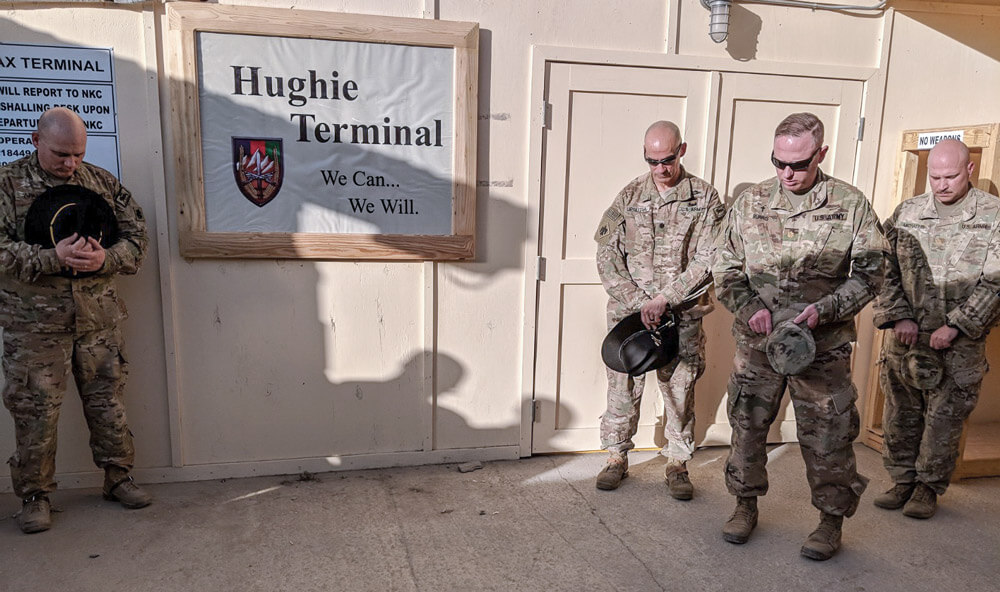
“Everybody went to him because they trusted him,” CSM Jolly explained. “He was also a 68 Whiskey [Combat Medic Specialist] so that’s the reason he was nicknamed ‘Doc Hughie’.”
SGT Hughie was a beloved Soldier who left a legacy of selflessness and courage that has had a great influence on the 180th.
“During our time in country, some of us had been under fire. [We were] hit with roadside bombs and came away with minor bumps and bruises,” SFC Smith said. “Some of us had experienced seeing casualties from partner units and friendly forces, but on February 19th, 2007, we lost one of our own.”
The dedication of the Hughie Terminal served as a fitting final tribute to SGT Hughie’s valiant act.
“There’s a lot of things Soldiers do, but when they give the ultimate sacrifice, I think we need to remember them,” CSM Jolly said. “For him to lose his life in that country, and for the terminal in that country to be named after him for the sacrifice he [made for that nation], I think that speaks high on a lot of things.”
“It was a great honor to be able to do that for him and his Family,” said CSM Apala. “I think for me it’s an honor because serving with that caliber of Soldier is just phenomenal. He was a very responsible, respectful and dedicated Soldier. He was willing to give everything. And it wasn’t for an American Soldier—it was for one of our Afghan brothers.”
SGT Hughie also had a Forward Operating Base named after him, as well as a memorial highway in Oklahoma. His extraordinary contributions to his unit, the Guard, his Nation and his Family are remembered through these memorials.
SGT Hughie’s newest tribute, the Hughie Terminal, not only honors his honorable service and sacrifice, but it also acts as a reminder to always remember and honor the Soldiers who gave everything for their country, no matter how long ago that sacrifice occurred.
“Little things like that mean a lot to the Soldiers that served with him and also his Family,” CSM Jolly explained. “It’s easy to acknowledge it when it happens and move on, but I think it’s good that we don’t forget. For the younger generations and the Soldiers in the units now, I don’t want them to forget. They might not know [the fallen Soldiers] individually like we did, but I don’t want the Soldiers’ stories to be forgotten.”
By Staff Writer Tatyana White-Jenkins
